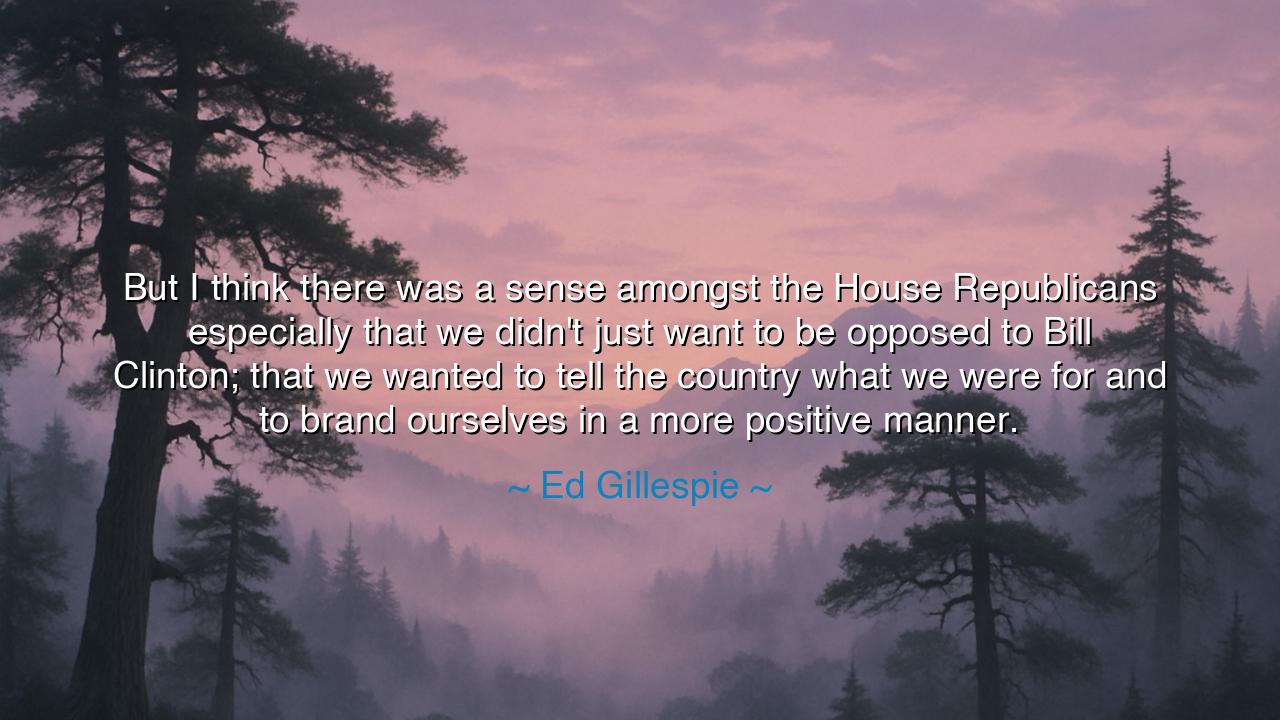
But I think there was a sense amongst the House Republicans
But I think there was a sense amongst the House Republicans especially that we didn't just want to be opposed to Bill Clinton; that we wanted to tell the country what we were for and to brand ourselves in a more positive manner.






Hear the words of Ed Gillespie: “But I think there was a sense amongst the House Republicans especially that we didn’t just want to be opposed to Bill Clinton; that we wanted to tell the country what we were for and to brand ourselves in a more positive manner.” In this utterance lies a truth that echoes across the ages: opposition alone is barren. To merely resist is to be remembered as a shadow. True greatness is found not in negation but in declaration, in the forging of vision that leads the people forward.
The ancients understood this law of governance. Rome was not built by those who merely opposed the kings, but by those who, after casting off tyranny, set forth the laws of the Republic and the dreams of a people. To be only “against” is to dwell in destruction; to be “for” something is to become a builder of civilizations. Gillespie’s words reflect this wisdom: that the House Republicans sought not merely to fight Clinton, but to claim their own standard, their own creed, and thus to be more than opposition—they would be architects of identity.
Consider the story of Pericles in Athens. His rivals could attack or resist him, but what made him endure was not his quarrels with others, but his vision of a city radiant in marble, strong in democracy, and filled with art. By declaring what he was for, he inscribed his name into history. His opponents, remembered only for opposition, faded like smoke. So too does Gillespie remind us that a party or a people must stand on more than hostility; they must hold aloft a banner of hope and purpose.
There is also caution in his words. For to brand oneself in a positive manner is not a task of deceit but of truth. If the substance beneath the brand is hollow, the people will see through it, and the structure will collapse. But if the message is rooted in conviction and vision, then the country may follow with faith. Opposition may gather crowds, but vision builds nations.
So let the generations remember: in every struggle—whether of politics, of tribes, or of hearts—the greater path is not to cry out only what we resist, but to proclaim boldly what we seek to build. The voice that says “No” may echo for a season, but the voice that says “Yes” shapes the destiny of centuries. In this, Gillespie’s reflection is not just of a moment in America’s history, but a universal teaching for all who would lead.






UNmai uyen nguyen
It seems like Ed Gillespie is acknowledging the importance of not just playing defense in politics. But can a political party’s identity really be built solely on what it’s for, or does the opposition play a crucial role in shaping the narrative? How do both factors combine to influence a party’s success or failure?
PDPhuc Duy
This quote makes me think about the power of positive branding in politics. In today’s environment, is it even possible for a political group to gain traction without offering a clear vision and reason for voters to support them, beyond just being opposed to the other side? Could this approach make a difference in modern politics?
THNguyen Thi Hue
What I find fascinating here is how Ed Gillespie touches on the importance of defining a political brand in a way that resonates with the public. Is it enough to oppose a popular figure, or should political parties always strive to offer their own vision? And if they do, how do they ensure that vision aligns with the needs and hopes of the electorate?
THVi Thi Hue
It's clear that the House Republicans were thinking beyond simple opposition in this context. But what does it say about political strategy when a party decides to focus on branding itself positively? Does it indicate a deeper understanding of the electorate’s desire for vision over criticism?
TPPham trieu phu
I wonder if this idea of branding oneself positively rather than just opposing a rival reflects a shift in how politicians view their roles. Could it be that, by focusing on what they stand for, they seek to attract broader support rather than just rallying around opposition? How does this strategic approach differ from traditional politics?